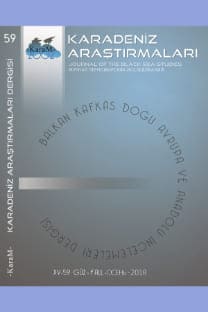The political participation of Turkish minority in Bulgaria and the public reaction: The case of movement for rights and freedoms (1990-1994)
Bulgaristan
Bulgaristan'daki Türk azınlığın siyasi katılımı ve halk tepkisi (İngilizce)
Bulgaria,
___
- Acaroğlu, M.Türker, Bulgaristan Türkleri Üzerine Araştırmalar I [Studies on Turks of Bulgaria I], İstanbul, IQ Yayınları, 2007.
- Anagnostou, Dia, “Nationalist Legacies and European Trajectories: Postcommunist Liberalization and Turkish Minority Politics in Bulgaria”, Southeast European and Black Sea Studies, Vol.5, No.1, January 2005,pp:89-111
- Bates, Daniel G., “What’s in a Name? Minorities, Identity and Politics in Bulgaria”, Identities, Vol.1 (2-3),pp:201-225
- Bojkov, Victor D., “Bulgaria’s Turks in the 1980s: a minority endangered” , Journal of Genocide Research, Vol.6, No.3, September 2004,pp:343-369
- Brunnbauer, Ulf, “The Perception of Muslims in Bulgaria and Greece: Between the ‘Self’ and the ‘Other’”, Journal of Muslim Minority Affairs, Vol.21, No.1, 2001,pp:39-61
- Canefe, Nergis, “Foundational Paradoxes of Balkan Nationalisms-Authenticity, Modernity and Nationhood”, Turkish Review of Balkan Studies, 2003, pp:107- 147
- Crampton, R.J., A Concise History of Bulgaria, 2.ed., Cambridge,Cambridge University Press, 2005
- Dayıoğlu, Ali, Toplama Kampından Meclis’e (Bulgaristan’da Türk ve Müslüman Azınlığı) [From Concentration Camp to the Parliament (The Turkish and Muslim Minority in Bulgaria)], İstanbul, İletişim Yayınları, 2005
- De Nevers, Renee, Comrades No More, The Seeds of Change in Eastern Europe, Cambridge, MA, The MIT Press, 2003
- Eminov, Ali, “The Turks in Bulgaria:Post-1989 Developments”, Nationalities Papers, Vol:27, No:1, 1999,pp:31-55
- Gallagher, Tom, Outcast Europe:The Balkans, 1789-1989 (From the Ottomans to Milosevic), New York,N.Y., Routledge, 2001
- Gallagher, Tom, The Balkans After The Cold War, From Tyranny to Tragedy, New York,N.Y., Routledge,2003
- Georgieva, Tsvetana , “Pomaks:Muslim Bulgarians”, Islam and Christian-Muslim Relations, Vol.12, No.3, July 2001,pp:303-316
- Hupchick, Dennis P., The Balkans, From Constantinople to Communism, New York, N.Y., Palgrave Macmillan, 2004
- Jelavich, Barbara; Balkan Tarihi 18. ve 19. Yüzyıllar [History of the Balkans: Eighteenth & Nineteenth Century], İstanbul, Küre Yayınları, 2006
- Johnson, Carter, “Democratic Transition in the Balkans: Romania’s Hungarian and Bulgaria’s Turkish Minority”, Nationalism and Ethnic Politics, Vol.8, No.1, Spring 2002, pp:1-28
- Karpat, Kemal H., Balkanlar’da Osmanlı Mirası ve Ulusçuluk [Nationalism and The Ottoman Legacy in the Balkans], Trans: Recep Boztemur, Ankara, Imge Kitabevi, 2004
- Konstantinov, Yulian, “‘Nations-State’ and ‘Minority’ Types of Discourse— Problems of Communication between the Majority and the Islamic Minorities in Contemporary Bulgaria”, Innovation in Social Sciences Research; Vol.5, Issue. 3, pp:75-89
- Kut, Şule, Balkanlar’da Kimlik ve Egemenlik [ Sovereignty and Identity in the Balkans], İstanbul, Bilgi Üniversitesi Yayınları, 2005
- Küçükcan, Talip, “Re-claiming Identity: Ethnicity, Religion and Politics among Turkish-Muslims in Bulgaria and Greece, Journal of Muslim Minority Affairs, Vol.19., No.1, 1999, pp:49-68
- Mahon, Milena, “The Turkish Minority Under Communist Bulgaria – politics of ethnicity and power” Journal of Southern Europe and the Balkans, Volume:1, No:2, 1999,pp:149-162
- McIntosh, Mary E., Martha Abele Mac Iver, Daniel G. Abele, David B. Nolle, “Minority Rights and Majority Rule: Ethnic Tolerance in Romania and Bulgaria”, Social Forces, Vol.75, No.3, March 1995,pp.939-967
- Merdjanova, Ina, “Uneasy Tolerance: Interreligious Relations in Bulgaria After the Fall of Communism”, Religion in Eastern Europe, Vol:XXVI, No:1 (February 2006), pp:1-10
- Neuburger, Mary, “Bulgaro-Turkish Encounters and the Re-imagining of the Bulgarian Nation (1878-1995)”, East European Quarterly,Vol:XXXI, No:1,March,1997,pp:1-20
- Neuburger, Mary, “Pomak Borderlands: Muslims on the Edge of Nations”, Nationalities Papers, Vol.28, No.1, 2000,pp:181-198
- Nikova, Ekaterina, “Changing Bulgaria in the Changing Balkans”, Balkans, A Mirror Of The New International Order, Eds: Günay Göksu Özdoğan, Kemali Saybaşılı; İstanbul, Eren Yayıncılık, 1995, pp:189-195
- Özgür, Nurcan, Etnik Sorunların Çözümünde Hak ve Özgürlükler Hareketi [The Movement for Rights and Freedoms in Solving Ethnic Problems], İstanbul, Der Yayınları,1999
- Özgür, Nurcan,“1989 Sonrası Türkiye-Bulgaristan İlişkileri”(Turkish-Bulgarian Relations After 1989), Türk Dış Politikasının Analizi [The Analysis of Turkish Foreign Policy], Ed:Faruk Sönmezoğlu, İstanbul, Der Yayınları,2004, pp:609-681
- Ragaru, Nadege, “Islam In Post-Communist Bulgaria: An Aborted ‘Clash Of Civilizations’”, Nationalities Papers, Vol.29, No.2, 2001, pp:293-324
- Snyder Jack, Karen Ballantine, “Nationalism and the Marketplace of Ideas”, Nationalism and Ethnic Conflict, Eds:Michael E.Brown, Owen R.Cote,Jr, Sean M. Lynn-Jones, Steven E. Miller, Revised Edition, Cambridge,MA, The MIT Press,1997,pp:61-96
- Todorova, Maria, “Conversion to Islam as a Trope in Bulgarian Historiography, Fiction and Film”, Balkan Identities (Nation and Memory), Ed:Maria Todorova, London, Hurst&Company, 2004,pp:129-157
- Todorova, Maria, “The Ottoman Legacy in The Balkans”, Balkans, A Mirror Of The New International Order, Eds: Günay Göksu Özdoğan, Kemali Saybaşılı; İstanbul, Eren Yayıncılık, 1995,pp:55-74
- Todorova, Maria, Balkanları Tahayyül Etmek(Imagining The Balkans), Trans: Dilek Şendil, İstanbul, İletişim Yayınları, 2nd ed., 2006
- Warhola, James W.; Orlina, Boteva, “The Turkish Minority in Contemporary Bulgaria”, Nationalities Papers, Vol.31, No.3, September 2003,pp:255-279
- Vassilev, Rossen, “Bulgaria’s Ethnic Problems”, East European Quarterly, Vol.36, No.1, March 2002,pp:103-125.
- ISSN: 2536-5126
- Yayın Aralığı: 4
- Başlangıç: 2004
- Yayıncı: Osman Karatay
Tanzimat'ın eyalet reformları 1840–64 Silistre Örneği
Trabzonlu Bir Yerel Tarihçi: Hasan Umur
Kitab-ı Dede Korkut (KDK) eposunda bir harfin "Kurban"ı olan metafor ve Onun Çevirileri
Kafdağı'nın ardında saklı kalan komşuluk Avrupa Birliği ve Güney Kafkasya
Kitab-ı Dede Korkut Destanı ve Oğuz Türklerinin İctimai-Siyasal Kuruluşu Hakkında
